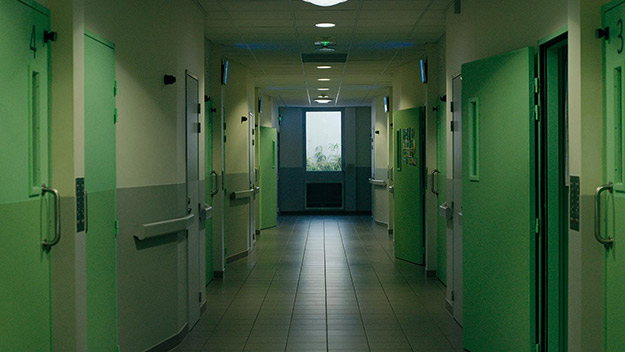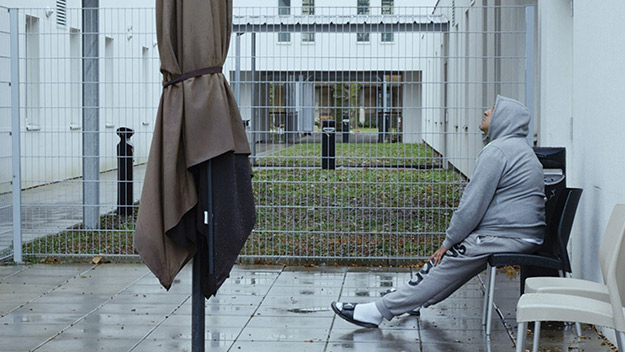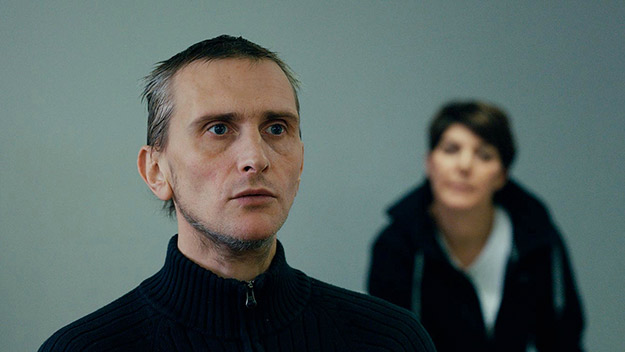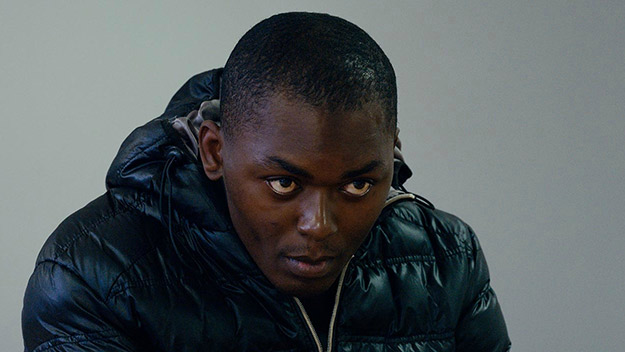Film of the Week: 12 Days

There are few sights in a movie more poignant than inmates in an institution—a prison, or a mental hospital—mooching around in tracksuits, because you know they’re not going to be running anywhere anytime soon. This image appears in Raymond Depardon’s documentary 12 Days, and although we see it only sporadically, in brief interludes between the film’s main chapters, you rather wish that it hadn’t been milked for its poetic or sentimental resonance—which it partly is, along with other images of human desolation, by being set to delicate piano-and-strings music by Alexandre Desplat. 12 Days doesn’t need this kind of emotional rhetoric to move its audience; you suspect that if Depardon had just held back and given us the more purely observational work that comprises most of the film, 12 Days would have felt more substantial and incisive.
As one of Europe’s great still photographers and photojournalists, Depardon the documentarist often can’t resist focusing on an obviously telling image, although much of his screen work is less about those images than about the people his camera captures as he gets them to talk about their lives: notably the farmers in a changing rural France, in his Profils paysans trilogy (2001-08). 12 Days is most provocative when it simply gives us people and a sense of the system they inhabit, in some cases reluctantly. Shot in Le Vinatier Hospital, a mental facility in Lyon, the film documents a series of sessions in which patients interned involuntarily—to prevent them doing harm to themselves or others—come face to face with judges whose job it is to decide, after a mandatory period of 12 days, whether due process has been followed, whether the institution has correctly responded to the patient’s needs, and whether the patient should therefore be released or held for further treatment.
The film consists of a series of case studies, though that term should be used advisedly: we get a sketchy impression of each patient’s history, as they explain themselves and as we watch each judge come to grips with the rudiments of his or her case. (Although we hear patients’ names, an opening caption points out that they have been changed to protect anonymity.) The sessions take place in a small office-like room, with only a handful of people present—the judge, the patient, the patient’s lawyer, and sometimes a member of the hospital staff. Depardon gives us three angles—one on the judge, another on the patient’s side of the table, and a slightly different angle on the patient in close-up. The set-up is enclosed, severe but not oppressive, the atmosphere somewhere between legal chambers and clinic, and yet the calm, sympathetic demeanor of all the judges seems to create a relaxed atmosphere. Even though several have committed acts of violence, we never sense that the patients are being criminalized. Whether that means they feel at ease, or confident that they are not on trial, is something that emerges differently from session to session.

Some patients are acutely aware of their conditions and histories, which are often profoundly traumatic. A young Angolan man who has stabbed a woman 13 times argues that a history of homelessness has contributed to shaping his mental state. A young woman with a history of self-harm tells a horrifying story of eight rapes, and while it seems clear that sexual trauma has affected her drastically, we also become aware of the complex narrative structure that she has created around her experience, which includes the conviction that a girl attacked her by telepathy.
Delusion often plays a part—you might say, “speaks its role,” expressing itself in a manner sometimes at odds with the conscious discourse of the patient. A 20-year-old man named Said, apparently from a Muslim background, seems to be telling the kind of story he wants the French authorities to hear, complaining about “fake Muslims” and explaining that his neighbors were extremists, causing him to take a Kalashnikov from their cellar. The story he isn’t able to consciously tell is of “severe, resistant schizophrenia” aggravated by drug use.
An especially distressing case is that of a middle-aged woman who, rather than having an obviously traumatic history or a deep-rooted mental condition, appears—or so we imagine from her story—to have been suddenly thrown off a path of everyday normality by the extreme pressures of her life. The super-garrulous Annick Moulis represents the film’s most overt there-but-for-the-grace-of-God moment. One Saturday, she got up intending to go to Lyon’s Lumière Film Festival, but decided to go to a hospital emergency room instead. We don’t quite come to understand what happened there, but she complains that it took 12 people there to tie her down, and that she was subject to “extreme violence.” But we begin to wonder whether she’s also referring to a violence more subtly exerted in her everyday life. Her job is in the billing department of the Orange phone company, and although she says that her coworkers were supportive, she also complains of harassment. At this point, her lawyer points out that Orange has a bad reputation for its treatment of workers (the company, formerly France Telecom, has a disturbing history of staff suicides). We can only imagine the circumstances that have brought this chatty, self-aware woman to declare, “I’m an open wound.”

Depardon’s detached, objective filming style—with its exchanges of static shots, usually holding at some length on the patient—prevents us from siding with either patients or authorities, although there’s one moment at which we feel we’ve been brought more into knowing complicity with the latter than we might wish. The patient, here named “Florian Chapuis,” is a severe, intense-faced man who seems to have styled himself along the lines of a Bond villain or a hip Sorbonne lecturer: black clothes, spiked hair, thin fringe of beard sans moustache. Apart from a slight slur and monotone delivery, he seems eminently lucid. He complains of feeling at once abandoned and smothered, and speaks with concern about his father, who has social problems of his own; he’d really appreciate it if the authorities would make contact with the old man.
Frankly, says Chapuis, he can’t see why he’s being held in a psychiatric ward. Perhaps that’s the problem, says the judge—an insufficient understanding of his own situation. At this point, Chapuis’s coherent discourse starts to unravel. “My father was beatified,” he says. “Ah,” says the judge knowingly. Chapuis points out that he has things to do, and a political party to organize, and if they don’t believe him, they can check with Olivier Besancenot—a French left-wing politician whom the subtitles, with a degree of poetic license, translate as “Bernie Sanders.” For the first time, we now see a white-coated hospital orderly by Chapuis’s side. Before leaving the room, Chapuis declares himself to be “a trinity” and calmly warns, “My political party’s going to wipe out psychiatrists.” It’s an extraordinary scene, but its effect is perhaps adulterated by Depardon choosing to cut out on what’s essentially a shock punchline, as the judge quietly tells those present that Chapuis killed his father.
The film begins with a quote from Michel Foucault, translated as, “The path from man to true man goes by way of madman”—which perhaps is a way for Depardon to signal that we all walk a precarious line between sanity and its obverse. The film certainly comes across as being essentially Foucaldian in its observations—notably in the case of Said, whose obsession with imaginary Muslim terrorists is an example of the way that contemporary political discourse provides a coherent script for different forms of mental illness to express themselves. The same can be said for the ways in which different patients articulate their situation in what they see as the language of the institution, whether it’s Said stating, “I’m very mentally ill… I have the mentality of a sub-mental,” as the subtitles put it, or Majembe, the Angolan, saying, “I am the one who has to obey, to respect France.”

There’s a distinct echo of Foucault’s analysis of the official understanding of madness in the situation itself. It consists of a number of calm, detached professionals, women and men, taking a disinterested and rational attitude in listening to the patients and deciding whether or not they should continue to be interned. The system seems altogether humane and compassionate, not least in the calm, composed intimacy with which the sessions are conducted; we’re a million miles from the impersonal, factory-like, corporately driven system of internment depicted in Steven Soderbergh’s current drama Unsane. The judges present themselves less as authority figures than sympathetic listeners. Yet the system is strange in that they are not mental health professionals, and their job is simply to pronounce on whether people have been correctly treated and should continue to be so treated.
The judges appear to work on the basis both of case dossiers and of the patients’ self-presentation. Yet the rapidity with which they give their calm verdicts makes you wonder whether they are partly box-ticking, signing off on what the doctors recommend, while giving the patient the impression of a calm, sympathetic hearing. If so, the sessions could either be seen as a superficial whitewash—one patient certainly rages against “abuse of power”—or alternatively, as part of a therapeutic process by which patients can be assured that they have the chance to be heard, understood and empathized with by a representative of authority.
We don’t get a clear sense, nor do we need to, of Depardon’s own view on the matter, but where the film becomes less persuasive, even emotionally coercive, is in the interludes between the consultation scenes. The film begins with a long, slow camera glide up a hospital corridor, which suggests that Depardon has been watching Apichatpong Weerasethakul’s Syndromes and a Century. Occasionally we see patients drifting up these corridors in hospital fatigues; we watch a man swaying repeatedly, obsessively; at one point, Depardon shows us a bed with straps through an open doorway. We also hear a woman screaming from behind a closed door about persecution by demons. Some of these images are deeply telling, contrasting the extremity of mental suffering with the calm observation practiced in the sessions, but Depardon occasionally seems to be tugging at our emotions too obviously. Around the film’s midpoint, an extended sequence shows an elderly man pacing aimlessly among mesh fences and plastic chairs in a grey mist. This sight might have been highly effective presented raw, and more briefly, but when set to Desplat’s excessively tasteful melancholic score, it’s a case of egregious pathos, jarring in a film that otherwise thrives on observational detachment. When the film ends with a montage of roads around Le Vinatier cloaked in early morning mist, blue light, and more Desplat strings, what’s it telling us? The world is a sad place, and mental illness is sadder still? It feels like cheap embellishment for a film that has harder, more challenging points to make, and questions to ask.
Jonathan Romney is a contributing editor to Film Comment and writes its Film of the Week column. He is a member of the London Film Critics Circle.







